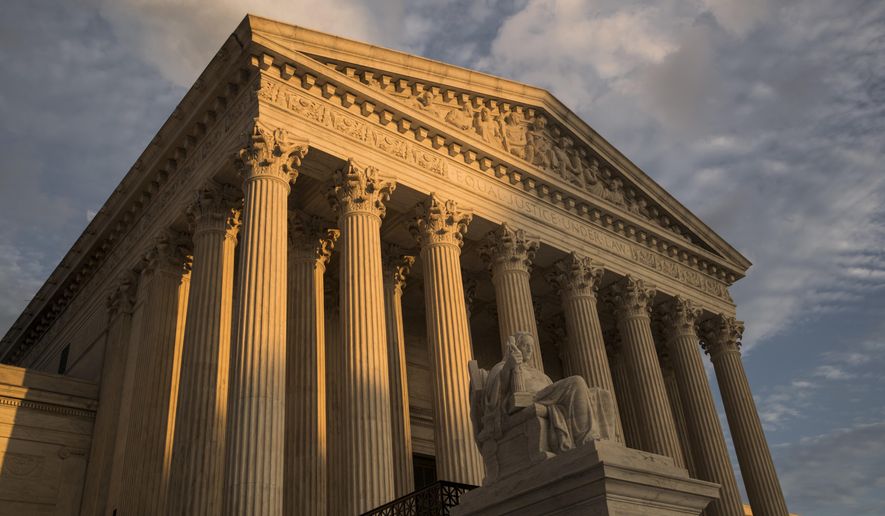The Supreme Court on Tuesday upheld an Indiana law that requires aborted fetal remains to be given burial or cremation, ruling the state has a valid interest in governing how the remains are handled.
But the justices declined to reinstate provisions of the state’s law that banned abortions when the decision is based on race, sex or a diagnosed disability, such as Down syndrome.
With the second challenge, the high court said it wanted to let more cases percolate in the lower courts before taking up the highly charged issue.
The court’s decision, coming at a time when abortion politics are heating up in the states and on Capitol Hill, signaled the justices are taking a methodical approach to the laws being passed by aggressive legislators.
But that didn’t deter rhetorical fireworks, Supreme Court-style, with Justice Ruth Bader Ginsburg lashing out at Justice Clarence Thomas for calling pregnant women “mothers.”
He fired back, calling her partial dissent from the court’s decision-making Tuesday nonsensical and saying the Supreme Court will eventually have to grapple with the issues Indiana’s law raised over women obtaining abortions for reasons others might find abhorrent.
“The use of abortion to achieve eugenic goals is not merely hypothetical,” he wrote. “The foundations for legalizing abortion in America were laid during the early 20th-century birth-control movement. That movement developed alongside the American eugenics movement.”
A lower appeals court had enjoined Indiana’s abortion prohibitions as an infringement on women’s rights.
Sital Kalantry, a professor at Cornell Law School, said that leaves eight states with bans on sex-selective abortions, while one — Arizona — still has a ban on race-selection.
She said the court’s decision to not settle the legality of these bans will likely lead to other states passing similar measures to work their way back up to the high court.
But she questioned the need for those laws.
“Few women abort fetuses on the basis of sex and it is both impossible and racist to claim that women abort fetuses on the basis of race,” she said.
Indiana’s law covering both the abortion prohibitions and fetal disposal was signed by Vice President Mike Pence when he was still governor in 2016. It came during the wake of undercover videos showing Planned Parenthood officials across the country apparently negotiating the sale of fetal body parts.
And in Indiana, MedAssure, a medical waste disposal company, was fined in 2016 for taking fetal remains from abortion facilities, including Planned Parenthood clinics, then disposing of it as solid waste.
Though it was not illegal in Indiana to dispose of fetal tissue at the time, the company did not have a permit to handle that kind of material, so it was fined more than $10,000.
Republican-led states responded with laws demanding better treatment of abortion remains. Under Indiana’s law, fetal remains must now be either interred or cremated.
Justice Thomas wrote that seemed like common sense to him.
“I would have thought it could go without saying that nothing in the Constitution or any decision of this court prevents a state from requiring abortion facilities to provide for the respectful treatment of human remains,” Justice Thomas said.
Justice Ginsburg and Justice Sonia Sotomayor said they would have ruled against the fetal disposal law.
And Justice Ginsburg also chided Justice Thomas about his choice of words, writing that “a woman who exercises her constitutionally protected right to terminate a pregnancy is not a ’mother.’ “
She agreed with the court’s decision to refuse to hear the race and sex abortion ban ruling, but said she would also have rejected hearing Indiana’s fetal material disposal law, calling it a waste of resources to have the justices weigh in at this point.
Justice Thomas said Justice Ginsburg’s opinion “makes little sense.”
Texas, which joined Indiana in passing a fetal remains law, said it was encouraged by Tuesday’s decision.
“The U.S. Supreme Court has repeatedly recognized that states have an interest in the lives of the unborn. This latest ruling honors the dignity of the unborn and prevents fetal remains from being treated as medical waste,” said Texas Attorney General Ken Paxton, who is currently defending his state’s law in court.
• Alex Swoyer can be reached at aswoyer@washingtontimes.com.




Please read our comment policy before commenting.